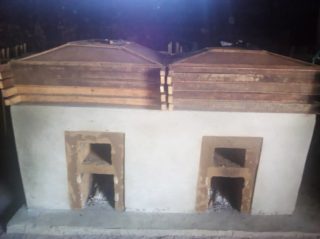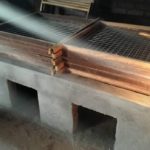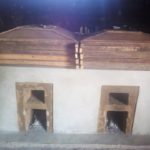 Completed Ahotor kiln inside a community banda
Completed Ahotor kiln inside a community banda

Completed Chorkor oven in community banda
The World Bank West Africa Regional Fisheries Program (WARFP) received a grant from the Energy Sector Management Assistance Program (ESMAP) to support piloting and promoting improved smoking ovens in West African countries. WARFP subsequently recruited MEP and Megapesca Lda for a phased study programme, involving physically installing pilot improved smoking ovens and conducting comparative performance assessments of existing and improved smoking technologies.
Phase I (May 2019 – October 2019) focused on the identification and evaluation of existing smoking oven technology in Tombo, Sierra Leone, and selecting a design and location for construction of improved pilot kilns. A methodological approach to assess the performance of different kiln designs used in West Africa (including improved designs) has now been developed, and its application in the field has been tested and proven to be feasible. A mobile phone-based system of data capture and transmission has been developed including guidelines for enumerators. Samples of fuel wood and smoked fish were taken, and testing laboratories in the EU were identified and commissioned for parameters related to fuel quality, and food quality and safety. Two types of improved kiln technology for Sierra Leone, including the ‘Ahotor’ and ‘Chorkor’ kilns, have been introduced and initial trials undertaken, with initial user feedback obtained. A baseline socio-economic sample survey was also conducted, which has characterised the social, health and basic economic conditions of women business operators engaged in fish smoking.
The data collected has allowed the estimation of some baseline KPIs for fish smoking performance, and will allow future proposed interventions to be accurately costed, as well as providing estimated costs for a substantial investment programme for alleviating the environmental, socio-economic, health and food safety impacts from the use of the hundreds of thousands of traditional kilns currently in use in West African fishing communities.

Completed Ahotor kiln inside a community banda
A future Phase II planned for mid-2020 will include the physical installation of a larger number of pilot smoking ovens in selected sites in West African countries, and the monitoring of outputs and definitive comparative assessments between ovens.
